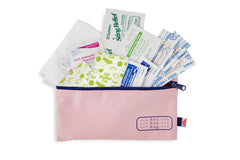Did you know that the fashion industry is responsible for 4-10% of global greenhouse gas emissions*?
This waste comes from discarded textiles but it also comes from manufacturing practices, packaging and shipping practices.
Here at Kibou we’ve been working hard since Day 1 to minimize our contribution to this global problem. We’ve identified SEVEN KEY WAYS that we can make a difference immediately, and we are committed to continuing to reduce our carbon footprint.
What we’re doing:
1. Guaranteeing our product by using the highest quality materials:Our goal at Kibou is to make parents’ lives easier. Period. So when you buy a Kibou, we want you to know that the materials and manufacturing processes are the best quality we can provide. How does this help the environment? Because durable textiles and high quality hardware last longer and don’t end up in landfills. And what if damage or a defect occurs? Of course, these things happen. When they do, we aim first to repair or replace a part that may not be functioning properly. Our solution is never simply to discard a bag. If you happen to have a problem with your Kibou that we cannot solve, we replace your Kibou with a new one, and we have you return yours for inspection and eventually for textile recycling.
2. Manufacturing with recycled textiles–including our vegan leather and nylon
This past year we took a huge step in more sustainably sourcing materials, shifting from all new textiles to using 60% post-consumer materials. In other words, 60% of the material used in our vegan leather and nylon is recycled from old textiles.
3. Choosing reusable materials over single-use
Kibous are not shipped in tissue paper, plastic or a drawstring dust bag. Instead we ship each Kibou in a nylon, zipper bag that can be used over and over again (from activities for restaurants to spare snacks or clothes that you stash in your stroller or car). Our aim with all the compatible accessories we sell is to reduce your own barriers to reusing as well; from Stasher Bags and Zoku utensils to our reusable shopping bags, our goal is to make it easy for you to be sustainable while on-the-go.
We love an unboxing video and fancy gift wrap as much as the next person–at least in theory–but in practice, that contributes to a lot of landfill waste. Every Kibou order is packaged only in our recycled nylon dust bag and placed inside our recycled poly mailers or our biodegradable, compostable gift boxes. Nothing more.
5. Shipping in recycled, recyclable or biodegradable materialsWhen we first started shipping Kibous, we used USPS mailers. A year later, we were thrilled to launch our own custom poly mailers, but we were troubled by the options: pay affordable prices for single-use plastic, or pay astronomical prices for recycled packaging. We’re so happy to share that we’ve found recyclable and biodegradable options for both our poly mailers and our gift boxes. And we will continue to do our homework to find even better ways to lessen our footprint here.
6. Supporting carbon-neutral shippingBy partnering with EcoCart, we are able to offer customers an inexpensive one-click solution to shipping carbon neutral. EcoCart provides a streamlined solution and transparent contributions to taking care of Earth through various projects across the globe. Click here to learn more.
7. Participating in a circular economyThough Kibou is too small to run our own second-hand market for our own bags that are no longer being used, we are big fans of purchasing used products whenever possible and for whatever use cases you’re comfortable with. Kibous are sold on second-hand websites, and we’ve even partnered with Loop, a baby gear rental company that allows you to borrow gear you may need or want to try out (with the option to buy what you love!)
And, of course, we’re huge proponents of gifting your Kibou to another parent if and when the time comes that you’re no longer using it.
There’s LOTS of talk these days about Sustainability and Sustainable Fashion, but what that means and how brands put it into action aren’t always clear. What is clear is that there are things we can do to make a meaningful difference–both as a brand and as consumers. And Kibou is here to do our part.
Want to read more? Check out our blog “Back to School Sustainably” for much more information on what each of us can do to make a difference.
*According to a McKinsey & Co. 2020 report “Fashion on Climate”


